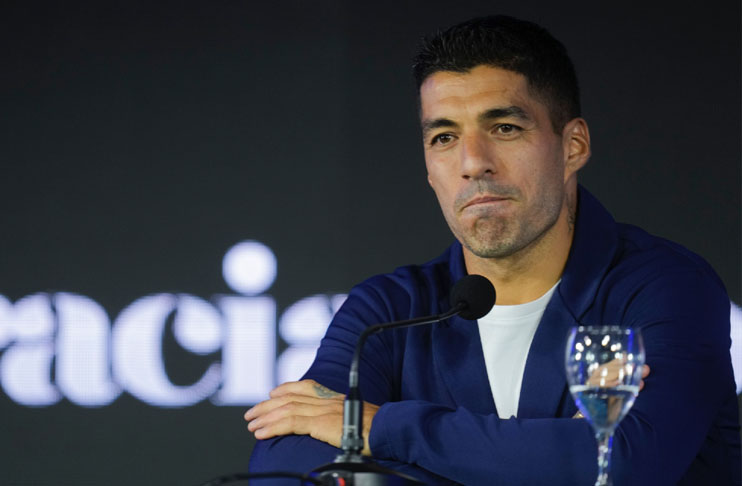Luis Suarez, a towering figure in Uruguayan football, announced his retirement from international play on Monday, signaling the end of an illustrious chapter in his career. The 37-year-old striker will make his final appearance for Uruguay in the upcoming 2026 World Cup qualifier against Paraguay in Montevideo this Friday.
At a press conference filled with emotion, Suarez shared his difficult decision with the world. “Friday will be my last match for my country,” he stated, his voice tinged with the weight of the moment. “It wasn’t an easy decision, but I’m content knowing I will give my all until the final game of my Uruguay career.”
Suarez’s announcement marks the conclusion of a storied international career that saw him rise to become one of the most prominent and controversial figures in modern football. Renowned for his lethal finishing, tenacity, and ability to change the course of a game in an instant, Suarez has been the face of Uruguayan football for over a decade. He leaves behind an indelible legacy as Uruguay’s all-time leading goal scorer, having found the back of the net 69 times in 142 appearances for his country.
Suarez’s journey with the national team began in 2007 when he made his debut as a young and promising forward. His rise to prominence was rapid, and he soon established himself as an integral part of the team. One of the highlights of his career came in 2011 when he led Uruguay to victory in the Copa America, a tournament where his performances earned him the prestigious title of Player of the Tournament. This victory, according to Suarez, stands out as the pinnacle of his career. “I wouldn’t trade the Copa America title for anything,” he reflected. “It was the best moment of my career.”

Over the years, Suarez represented Uruguay in nine major international tournaments, including four World Cups and five Copa America tournaments. His contributions were crucial in helping Uruguay qualify for the 2018 and 2022 World Cups, further cementing his place in the annals of Uruguayan football history.
However, Suarez’s career has also been marred by controversy, which has at times overshadowed his remarkable talents. Perhaps the most infamous incident came during the 2014 World Cup in Brazil when he was handed a four-month suspension for biting Italy’s Giorgio Chiellini. This was not the first time Suarez found himself at the center of a biting controversy, as similar incidents had occurred earlier in his club career.
Another significant controversy occurred during the 2010 World Cup in South Africa. In the quarter-final match against Ghana, Suarez deliberately used his hand to block a goal-bound shot in the dying moments of extra time. He was subsequently sent off, but the resulting penalty was missed by Ghana, and Uruguay advanced to the semi-finals after winning the penalty shootout. This moment, while lauded by some as a display of gamesmanship, cemented Suarez’s reputation as a player willing to do whatever it takes to win, even at the cost of fair play.
Suarez’s club career has also been marked by both brilliance and controversy. During his time at Liverpool, he was handed an eight-match ban for allegedly racially abusing Manchester United’s Patrice Evra, a charge that added another blemish to his otherwise stellar career. Despite these incidents, Suarez’s ability to deliver on the pitch was undeniable, and his time at Barcelona, where he formed a formidable partnership with Lionel Messi and Neymar, saw him reach the pinnacle of club football.
ALSO READ
- Today, the Bet Race Tournament Champion Rides Home on a Brand New Motorbike
- You Won’t Believe What Kylian Mbappé’s Father Did Behind the Scenes
- Diaz Shines as Liverpool Thrash Manchester United 3-0
As Suarez prepares to don the Uruguay jersey for the final time, there is no denying the impact he has had on both the national team and the global footballing community. His contributions have not only been in goals but in moments of inspiration, determination, and, yes, controversy. He has been a player who evoked strong emotions, whether it was admiration for his skill or criticism for his actions.
In his final years with the national team, Suarez adapted to a changing role. Under coach Marcelo Bielsa during the recent Copa America, he was used primarily as a substitute, yet he continued to make his presence felt, scoring his 69th international goal in a third-place play-off victory over Canada. Even in the twilight of his career, Suarez’s hunger for success and his passion for the game remained undiminished.
As he steps away from international football, Suarez leaves behind a legacy that will be remembered for its brilliance, its complexity, and its undeniable impact on the sport. His journey with the Uruguay national team may be coming to an end, but the memories he has created, both good and bad, will endure for years to come.



